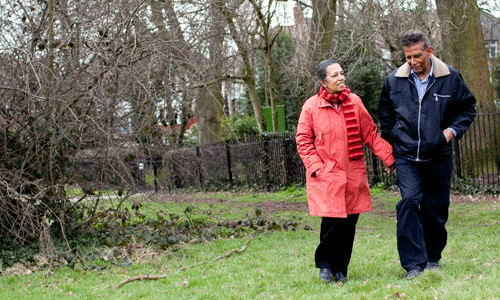
Menopause symptoms and finding support
Menopause is a completely natural part of life when hormones are changing, but some people can find this difficult or confusing. If you or someone you know needs support, there's information and advice available to help.
What is menopause?
Menopause is the result of changes in the levels of a hormone called oestrogen. It generally happens between the ages of 45-55, with the average being 51. It can also happen earlier, sometimes as the result of surgery or medical treatments.
Perimenopause is the period of time leading up to menopause. It begins when oestrogen levels start changing and ends when you reach menopause. This can start anywhere from late 20s to late 40s.
Anyone can be affected by hormonal changes during their lives for a number of reasons, including pregnancy, fertility treatment, gender transitioning, conditions needing hormone treatment and menopause.
What are the symptoms of menopause?
Perimenopause and menopause are both physical changes and their symptoms vary greatly from person to person. The symptoms can have an impact on your physical or mental wellbeing, comfort and performance at work. Research shows that 59% of women experiencing menopausal symptoms stated it had a negative impact on their work.
1 in 4 who go through menopause will be symptom-free, while 1 in 4 will have severe symptoms that have an impact on their day-to-day lives. While mainly women will be affected by perimenopause and menopause, these symptoms can be experienced by people who are trans, non-binary or intersex due to hormone treatments or the withdrawal of hormone treatments.
There are over 30 recognised symptoms, which include:
Physical health symptoms
- Hot flushes
- Night sweats
- Dizziness
- Fatigue
- Headaches
- Recurring UTIs
- Stiff joints, aches and pains
- Heavy periods
- Insomnia
- Itchy skin
- Osteoporosis
- Weight gain
Mental health symptoms
- Anxiety
- Memory loss
- Depression
- Reduced concentration
- Brain fog
Find out more about the symptoms of menopause on the NHS website
How can I manage symptoms of menopause?
A healthy diet and regular exercise, alongside simple lifestyle changes, can improve some symptoms and are important parts of the toolkit in dealing with menopause.
There's treatment available to help with symptoms and top up hormone levels. Modern forms of hormone replacement therapy (HRT) are low-risk and a popular choice of treatment.
Non-hormonal treatments and strategies can also be useful.
How do I find support for menopause?
There are different kinds of support available for those going through perimenopause or menopause.
Talking helps
It's important to know that you're not alone and support is out there. Try to be open about your symptoms with your partner, family and friends – it can help them understand what you're going through.
Sharing experiences with other people going through the same thing could be reassuring. There are many support groups, websites, blogs and videos online where people have shared their stories of menopause.
Support from your doctor
If you have any questions about treatment, or if you're struggling emotionally or physically, it's important that you speak to your doctor. Some areas have specialist Menopause Clinics that can provide advice on how to manage symptoms.
 We're here to help
We're here to help
We offer support through our free advice line on 0800 678 1602. Lines are open 8am-7pm, 365 days a year. We also have specialist advisers at over 120 local Age UKs.




